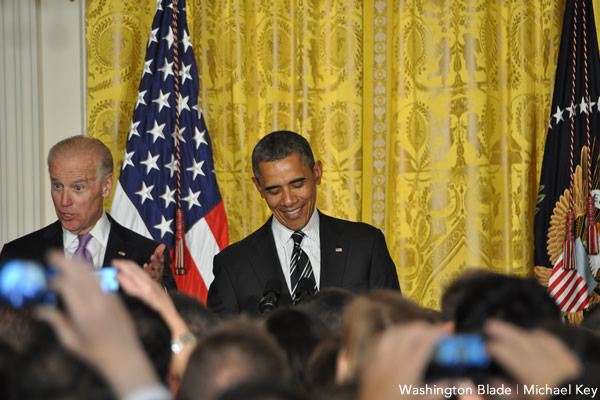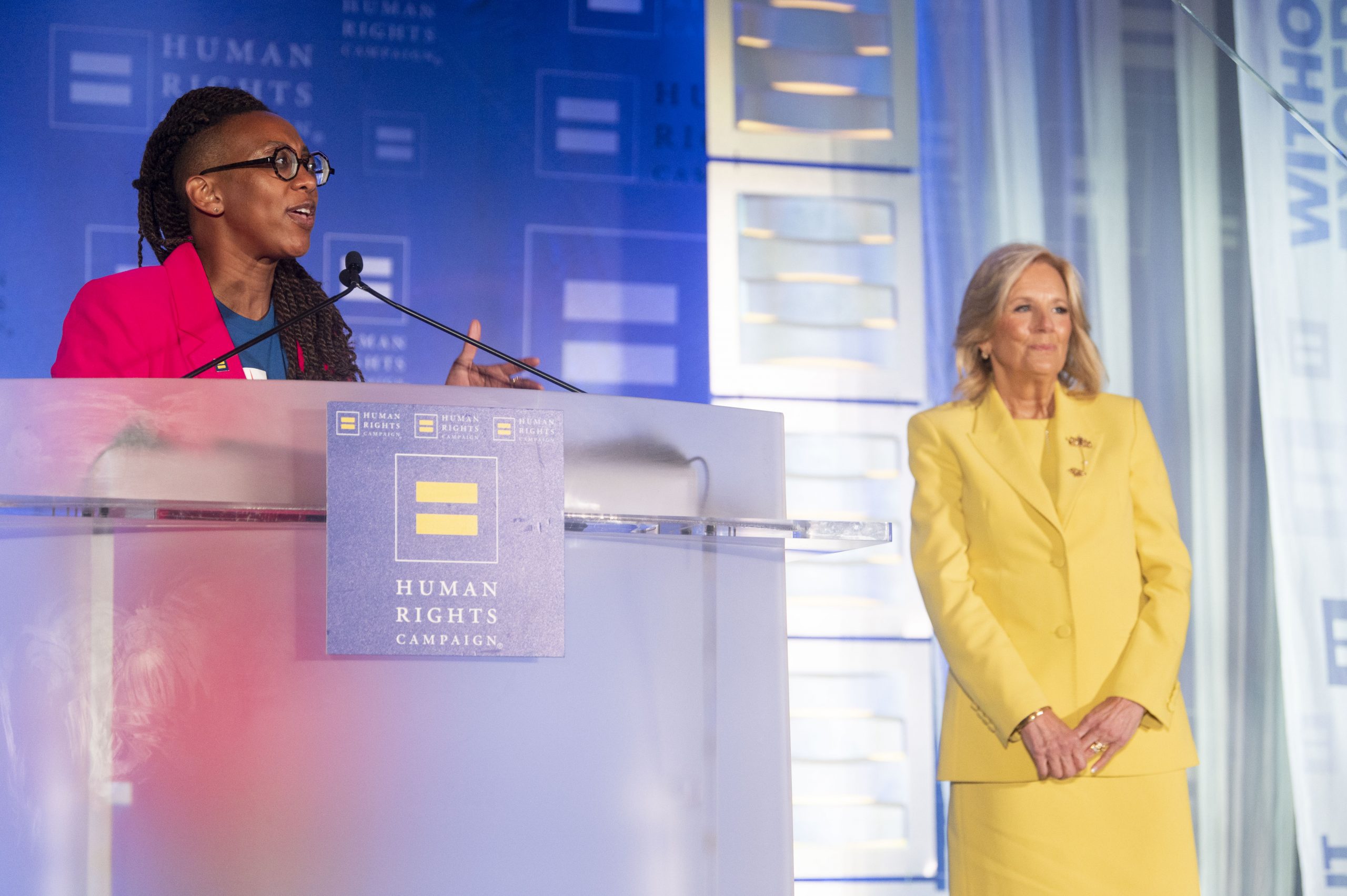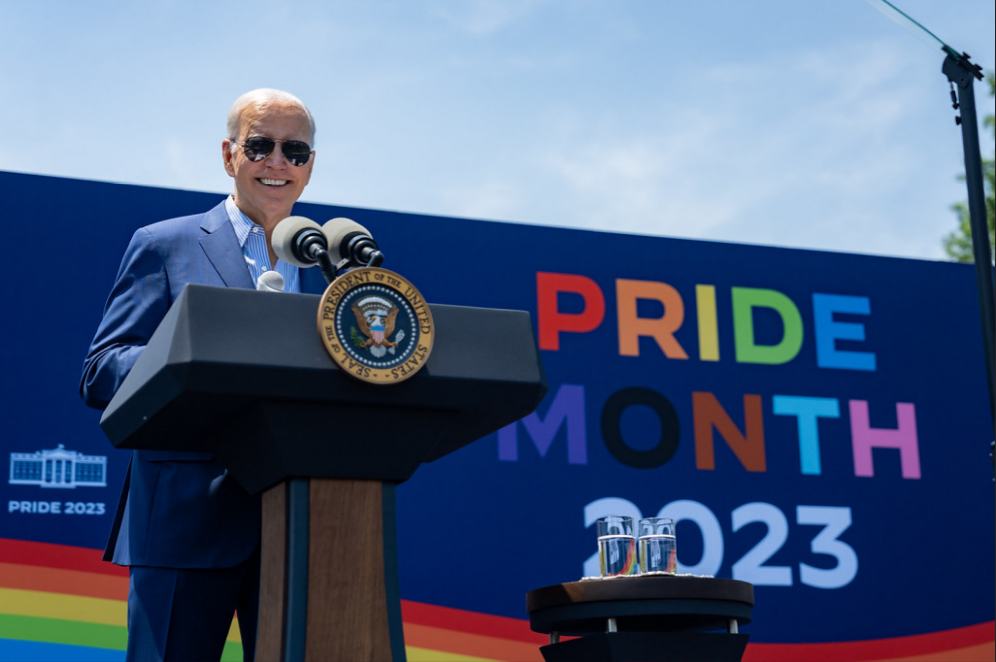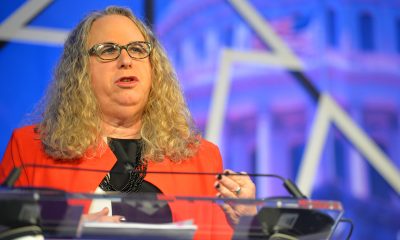Politics
Obama calls for ENDA passage at White House reception
No word from president on executive order for federal contractors


Vice President Joe Biden and President Barack Obama at the White House Pride reception (Washington Blade photo by Michael Key)
President Obama energized attendees at the annual Pride reception held at the White House on Thursday by saying “we need to get” the Employment Non-Discrimination Act passed.
Citing a letter he said he received from a PFLAG mom from Ohio named “Susan” expressing concern that LGBT people aren’t protected from harassment in the workplace, Obama said, “I share that concern,” and issued a call to pass ENDA — without mentioning the bill by name.
“There’s a bipartisan bill moving forward in the Senate that would ban discrimination against all LGBT Americans in the workplace, now and forever,” Obama said. “We need to get that passed. I want to sign that bill. We need to get it done now.”
Despite difficulties in passing ENDA — mostly notably the fact that Republicans are in control of the House — Obama told attendees in the East Room of the White House that he sees a path for passing the bill based on the successes the LGBT community has seen in recent years.
“And I think we can make that happen — because after the last four and a half years, you can’t tell me things can’t happen,” Obama said. “Look around. We’ve got gay and lesbian soldiers, and sailors, and airmen, and Marines who are here today. We’ve got married couples from places like New York and Washington State.”
The White House Pride reception took place amid renewed calls for Obama to sign an executive order that would bar federal contractors from discriminating against LGBT workers. Activists are calling the measure a campaign promise and say it’ll protect millions of workers from discrimination.
Last week, Ellen Sturtz, a lesbian activist affiliated with GetEQUAL, made headlines when she confronted first lady Michelle Obama about signing the executive order. Earlier on Thursday, eight activists from Ohio and Texas affiliated with GetEQUAL were arrested outside House Speaker John Boehner’s (R-Ohio) office in D.C. after they called on him to move forward with ENDA. Receiving no commitments from him, they also called on Obama to issue the executive order.
Tico Almeida, president of Freedom to Work, said “it’s fantastic” that Obama spoke out in favor of ENDA during the reception, but wants the president to take additional action behind the scenes.
“He should follow up his speech today by placing phone calls to lobby ENDA’s holdout Democratic senators like Florida’s Bill Nelson, West Virginia’s Joe Manchin and Mark Pryor of Arkansas,” Almeida said. “Between the president, Joe Biden, and the White House legislative team, I bet they could convince those Democrats to support ENDA.”
Despite the call to pass ENDA, LGBT advocates who have been calling for the executive order — and weren’t in attendance — said they still expect Obama to take administrative action to protect LGBT workers from discrimination.
Fred Sainz, vice president communications of the Human Rights Campaign, said he appreciates Obama’s support for legislation, but reminded him that issuing the executive order takes only the stroke of a pen.
“We’re elated to have the president’s support for ENDA,” Sainz said. “But we also want his support for an executive order. ENDA need not come before an EO. People’s jobs are on the line and there’s no time to waste.”
Almeida also renewed his call on President Obama to sign the executive order, saying previous responses from White House spokesperson Shin Inouye that the directive is “hypothetical” aren’t truthful.
“But no presidential speech or Champagne reception compares to the strong workplace protections that we will achieve once President Obama honors his five-year-old campaign promise to sign the federal contractor executive order,” Almeida said. “It’s time for President Obama to instruct his staffer Shin Inouye to stop pretending the executive order [is] ‘hypothetical.’ Shin is insulting gay and transgender victims of discrimination. It’s time for the president to sign.”
Inouye didn’t respond to a request for comment on Almeida’s assertions.
On Monday, the Washington Blade published an email from Democratic National Committee Treasurer Andrew Tobias asserting that the directive will happen. But Tobias wrote that “a process” is holding up the directive “that is broader than just this one very important and long delayed agenda item.”
Just hours before the reception, White House Press Secretary Jay Carney addressed the executive order in response to a question from NBC News’ Peter Alexander and maintained the administration prefers a legislative approach to the issue.
“I’ve answered this question a few times,” Carney said. “And we have said that we are supporting a legislative effort, the so-called ENDA legislation. And that’s the approach that we’ve taken. So I would not expect any executive order to be signed at the reception.”
‘We’ve made our world a little more full of love’
In addition to touting his support for ENDA, Obama ticked off various accomplishments over the past four-and-a-half-years with Vice President Joseph Biden at his side.
Among the noted achievements were “Don’t Ask, Don’t Tell” repeal, reauthorization of the Violence Against Women Act with explicit LGBT protections and the first national HIV/AIDS strategy. His mention of putting in place “new policies that treat transgender Americans with dignity and respect” elicited considerable shouts of approval from the audience.
Additionally, Obama commended the Senate for confirming — just hours earlier — Nitza Quinones Alejandro as the first openly gay federal Hispanic judge, saying she couldn’t attend because she’s getting ready to take her seat on the bench.
Obama also drew attention to his support for marriage equality — and speaking out in states where there have been efforts to legalize it — including the recent effort in Illinois where the session ended before the vote took place.
“I’ll continue to support marriage equality and states’ attempts to legalize it, including in my home state of Illinois,” Obama said. “We’re not giving up on that.”
Introducing Obama on stage were nine-year-old twins Zea and Luna, who began the reception by talking about a letter they wrote to Obama on LGBT issues. Upon entering the stage, Obama said, “I will not beat that act.”
Obama concluded his remarks by predicting that the efforts of those in the room would make for new achievements because “people who love this country can change it.”
“And I hope that when we gather here next year, and the year after that, we’ll be able to say, with pride and confidence, that together we’ve made our fellow citizens a little more free,” Obama said. “We’ve made this country a little more equal. We’ve made our world a little more full of love.”
LGBT attendees said they were pleased that the White House was holding the event, but are frustrated the issue of federal workplace non-discrimination protections hasn’t been addressed.
Those in attendance munched on hors d’oeuvres and stood around circular tables with refreshments while sipping Champagne from wine glasses. No crowd estimates were included in the pool report for the evening.
Lori Schreiber, a 54-year-old lesbian who serves as township commissioner in Abingdon, Pa., said she’s “very pleased” the White House held the Pride reception because “it acknowledges a group of people that are often not acknowledged.”
Still, she said an executive order to protect LGBT workers from discrimination would be helpful in her state of Pennsylvania, where there’s no law on the books prohibiting such discrimination.
“How it’s going in Pennsylvania is we’re going municipality by municipality, which isn’t working well,” Schreiber said. “It should just be across the country that everybody has the same rights in employment, housing, everything, and that doesn’t currently exist, so some of us are second-class citizens.”
Mike Manning, a 26-year-old bisexual actor known for being in MTV’s “Real World” in D.C., said he supports the president, but also said he “absolutely” wants him to issue the executive order and doesn’t understand why he hasn’t taken action.
“I’m surprised that hasn’t happened yet because it seems like a no-brainer, especially in a nation like the U.S.,” Manning said. “We’re such a power economy, we should have the best men and women doing the jobs…regardless of their sexual orientation or [gender] identity.”
Cathy Renna, 48, a lesbian communications specialist from Long Island, N.Y., said the Pride reception is “a symbol in and of itself” of the progress on LGBT issues in recent years, but noted she was frustrated by the lack of movement on workplace discrimination.
“I think I probably feel like the vast majority of other people in our community, who are wondering and sort of scratching their head — because I think the challenge is this is somebody who’s with us, so we’re just wondering why it’s not happening,” Renna said.
Among the LGBT notables who were in attendance at the event were Eric Fanning, under secretary of the Air Force; Daniel Baer, a State Department official recently nominated as U.S. ambassador to the Organization for Security and Cooperation in Europe; and Rev. R. Guy Erwin, who was recently elected the Evangelical Lutheran Church in America’s first openly gay bishop.
Politics
First lady warns Trump is ‘dangerous to the LGBTQ community’ at HRC event
Jill Biden spoke in Arlington, Va., on Friday

Delivering a keynote address at the Human Rights Campaign’s Equality in Action event Friday, First lady Jill Biden warned former President Donald Trump is “a bully” who is “dangerous to the LGBTQ community.”
Her appearance at the three-day volunteer and board gathering at the Sheraton Pentagon City in Arlington, Va., comes as part of the Biden-Harris reelection campaign’s “Out for Biden” program, which aims to “mobilize LGBTQ+ voters, communities, and leaders across the country.”
“Today, this community is under attack,” Biden said. “Rights are being stripped away. freedoms are eroding. More and more state laws are being passed targeting this community. Just last month, we had to fend off more than 50 anti-gay amendments that Republicans tried to force into the government funding bill.”
“These were extreme measures aimed directly at this community — measures that would have limited health care and weakened protections for same sex couples,” she said. “And they served only one purpose to spread hate and fear.”
In a nod to her long career as an educator, Biden said, “History teaches us that our rights and freedoms don’t disappear overnight. They disappear slowly. Subtly. Silently.”
She continued, “A book ban. A court decision. A ‘Don’t Say Gay’ law. One group of people loses their rights and then another. And another. Until one day you wake up and no longer live in a democracy … This is our chapter of history and it’s up to us how it ends.”
Biden then highlighted some of the advancements for LGBTQ rights secured under the Biden-Harris administration.
“Thanks to President Biden, marriage equality is now the law of the land,” she said. “He ended the ban on gay and bisexual men donating blood. He’s made it possible for trans Americans to serve openly and honorably in our military. And he’s standing firmly against conversion therapy.”
“Yes, there are forces outside these walls that are trying to erase these hard fought gains, trying to unwind all the progress that we’ve made,” Biden said. “They want to take our victories away, but we won’t let them. Your president will not let them — I will not let them.”
Politics
‘Out for Biden-Harris’ LGBTQ-targeted campaign is launched
Several events planned in coming weeks

The Biden-Harris campaign on Wednesday debuted “Out for Biden-Harris,” which is a “national organizing and engagement program to mobilize LGBTQ+ voters, communities, and leaders across the country.”
Out for Biden-Harris “will train supporters to organize within their own networks and leverage messengers from the community to ensure we are meeting LGBTQ+ voters where they are,” the campaign wrote in a press release announcement.
“From drag queens to elected leaders to LGBTQ+ faith leaders, Team Biden-Harris will use a wide range of validators to communicate what’s at stake for the LGBTQ+ community in this election and why it’s critical that we vote for Joe Biden and Kamala Harris.”
The campaign also previewed some of the events and initiatives in coming weeks, which will include:
- A virtual organizing call featuring actor Wilson Cruz, Congressman Robert Garcia, HRC President Kelley Robinson, to mobilize LGBTQ+ supporters;
- A series of virtual relational organizing trainings focused on activating and reaching new volunteers targeting battleground voters. The campaign will be engaging trusted messengers, including high-profile and trusted messengers in the LGBTQ+ community, like Brita Filter, Danica Roem, Gina Ortiz Jones, and Rev.
- Hosting a series of Out For Biden-Harris house parties and community events including events in Phoenix, Arizona, Ferndale, Michigan, Milwaukee, Wisconsin, Philadelphia, Pittsburgh, and Harrisburg, Pennsylvania, and Las Vegas, Nevada to mobilize supporters.
- First Lady Jill Biden will be a featured speaker at the Human Rights Campaign Equality In Action Conference bringing together a network of 400 organizers and activists in Arlington, VA.
The campaign noted that LGBTQ voters will be “a key part” of its coalition, while 39 percent of voters consider LGBTQ equality a “make-or-break issue.”
“In 2020, nearly 11,000 LGBTQ+ volunteers mobilized to help elect President Biden and Vice President Harris,” the campaign wrote. “This year, Out for Biden-Harris will re-engage these supporters and build on their work. The program is designed around the idea that there is no better messenger to mobilize LGBTQ+ voters than their friends and neighbors to bring new supporters into our campaign.”
The Biden-Harris administration is the most pro-LGBTQ in history, and LGBTQ groups with a combined 3.8 million members have endorsed President Joe Biden’s reelection campaign.
However, “the fight for equality for all Americans is at stake this November as Trump and his allies plan to roll back the rights and freedoms of LGBTQ+ Americans,” the Biden campaign wrote. “Trump and his MAGA allies are running on an extreme, anti-LGBTQ+ agenda which would push to discriminate against the LGBTQ+ community, even going after the right to marry who you love.”
“LGBTQ+ voters are a force to be reckoned with. They were critical to our victory in 2020, and they will be critical to winning again this November,” said Biden-Harris 2024 Campaign Manager Julie Chavez Rodriguez. “That’s why we’re thrilled to launch Out for Biden-Harris, which will harness the LGBTQ+ community’s organizing prowess to reelect President Biden and Vice President Harris this November.”
Chavez Rodriguez continued, “LGBTQ+ Americans couldn’t have more at stake this election: Donald Trump and his extremist allies are running to gut LGBTQ+ rights and erase history as their top priorities. LGBTQ+ Americans deserve leaders who will fight for every American’s freedom and dignity. That’s what President Biden and Vice President Harris have done throughout their time in office, and what they will do if reelected, including pressing Congress to pass the Equality Act.”
“There has never been a more critical time to protect the rights of all Americans, no matter who you love or how you identify, and Out for Biden-Harris will be critical to not just safeguarding, but strengthening the rights and voice of every single American,” she said.
Politics
Melania Trump to host Log Cabin Republicans event
Former first lady is close with the group

Former first lady Melania Trump is back on the campaign trail with plans to host a fundraising event for the conservative LGBT group Log Cabin Republicans on April 20 at Mar-a-Lago, Politico reported on Thursday.
Funds will be used to support the group’s “Road to Victory” program, which will target voters in swing states. LCR has had a close relationship with Mrs. Trump, who was a special guest for its Spirit of Lincoln Gala in 2021, where she received the Spirit of Lincoln Award.
Politico reports that the host committee for this month’s event will include GOP donors Saul Fox, Amanda Schumacher, Bill White, Bryan Eure and Richard Grenell, who is gay and served as ambassador to Germany and acting director of national intelligence during the Trump administration.
“Melania Trump’s work as first lady, from helping children reach their full potential to championing a more inclusive Republican Party, has been historic,” LCR President Charles Moran said in a 2021 press release concerning the Spirit of Lincoln event.
“Her vocal support of Log Cabin Republicans has been a signal to Republicans everywhere that it is possible to simultaneously be conservative and support equality under the law for all Americans,” he said.
-

 European Union5 days ago
European Union5 days agoGay Polish government minister represents change of course
-

 Opinions5 days ago
Opinions5 days agoNetanyahu must go!
-

 LGBTQ Non-Profit Organizations4 days ago
LGBTQ Non-Profit Organizations4 days agoDay of [no] silence, a call to speak out against anti-LGBTQ+ hate
-

 Colorado3 days ago
Colorado3 days agoFive transgender, nonbinary ICE detainees allege mistreatment at Colo. detention center











